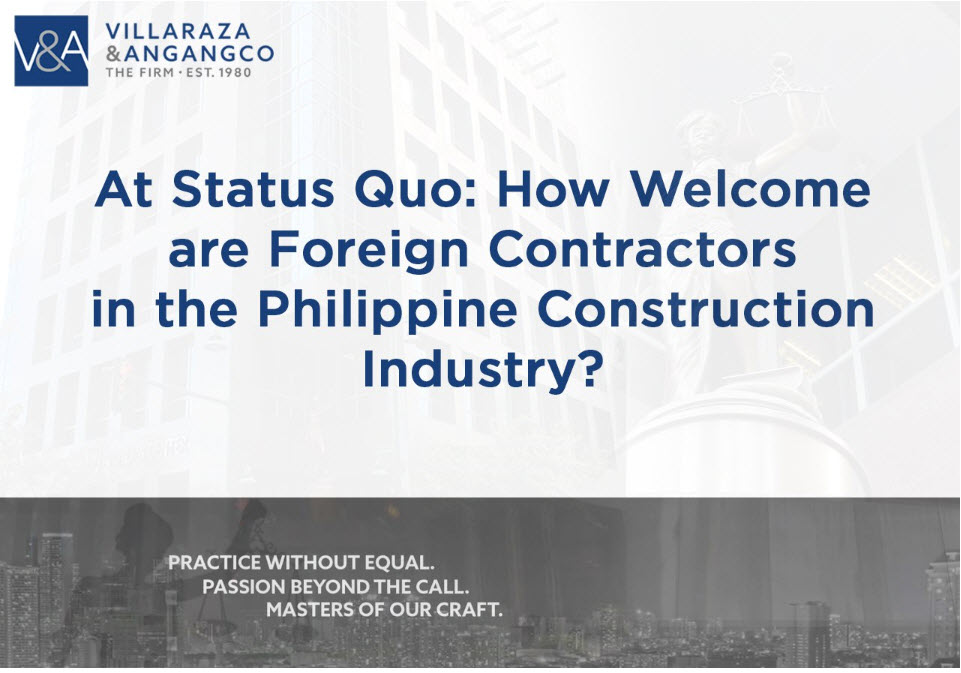

The Philippine construction industry is expected to continuously expand, banking on double digit growth rates for the foreseeable future, finally recovering from the hit the industry took back in 2020. On-going and prospective historical, modern, and infastructure projects are lining up, and the industry anticipates to welcome potential contractors, both domestic and foreign.
Guarding the entry of new contractors in the industry is the Philippine Contractors Accreditation Board (“PCAB”)— one of the regulatory authorities implementing Republic Act No. 4566 (or the “Contractors‘ License Law”), as supplemented by the Rules and Regulation Government Licensing and Accreditation of Constructors in the Philippines (“IRR”).
Originally, under Section 3.1 Rule 3 of the IRR, the PCAB issues two (2) types of licenses: (i) the Regular License reserved for corporations with at least 60% Filipino equity participation; and (ii) the Special License which may be issued to a joint venture, a consortium, a foreign contractor, or a project owner. Unlike a Regular License which allows contractors to pursue projects subject to habitual renewal of its license, the Special License is limited to a single specific undertaking/project. The reservation of a Regular License to corporations with at least 60% Filipino equity participation has been widely criticized by some members of the construction industry.
Supposedly loosening the restrictions on foreign participation in the construction industry, the PCAB, in 2015, issued Board Resolution No. 8 which introduced the third type of license - Regular License (Quadruple A Category) - allowing foreign-owned corporations incorporated in the Philippines to get a contractor’s license, but subject to inflexible capitalization requirements (e.g., One Billion Pesos [PhP1,000,000,000.00]).
In 2020, the Philippine Supreme Court En Banc in Philippine Contractors Accreditation Board v. Manila Water Co., Inc., (G.R. No. 217590, 10 March 2020) (the “2020 Decision”), declared Section 3.1 of the IRR, which restricts the issuance of a Regular License to corporations with at least 60% Filipino Equity participation, as void. The crux of the controversy is whether the PCAB has authority to add a nationality requirement on a contractor’s license, to which the Supreme Court confirmed that it does not. The Supreme Court En Banc stated that that the Contractors‘ License Law does not have any nationality-based distinction for the issuance of a contractor’s license, and that “PCAB went beyond the prescribed classifications under Section 16 of [Contractors‘ License Law] and proceeded to create the nationality-based license types under Section 3 [of the IRR]”.
The Supreme Court also had the opportunity to clarify that a construction business does not equate to one’s practice of profession which is limited to Filipinos. Finally, the Supreme Court subscribing to the views of the Philippine Competition Commission (the “PCC”) which acted as an amicus curiae, ruled that allowing foreign contractors in the Philippines encourages a healthy competition amongst domestic and foreign contractors. In a Notice dated 05 October 2021 (the “Notice”), the Supreme Court affirmed the 2020 Decision.
It noteworthy that even after more than a year from the Notice, the PCAB has yet to issue new regulations or amend its existing regulations. Absent new regulations, it appears that PCAB continuously implements a nationality-based distinction in issuing the contractor’s license.
Separately, the barrier on foreign contractors is not the only hurdle that foreign participants encounter in the Philippine construction industry. Other nationality restrictions in the industry subsist, such as the foreign equity restrictions on: (i) construction of defense-related structures under Commonwealth Act No. 541; (ii) corporations and joint ventures bidding to participate in infrastructure projects (subject to treaty agreements) under Republic Act No. 9184 (or the “Government Procurement Reform Act”); (iii) ownership of land under Section 7, Article XII of the Philippine Constitution; and (iv) practice of profession (e.g., engineers and architects).
Eagerly awaiting the amended PCAB rules, it would be interesting to see how the full opening of industry doors to foreign contractors would affect local domestic contractors, the growth of the construction industry, and the legislature’s reception to existing provisions on foreign equity restrictions.
~o0o~
For any questions or legal concerns relating to the Construction Industry, you may contact:
Ma. Carla P. Mapalo Maria Francesca S. Vergara
Partner Associate
mp.mapalo@thefirmva.com ms.vergara@thefirmva.com